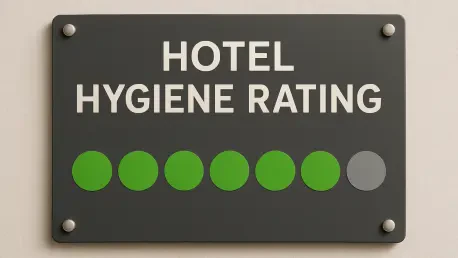In a surprising turn of events, a historic hotel in Plympton, Devon, known for its charm and celebrity guests like British singer Peter Andre, has recently been slapped with a troubling two-star food hygiene rating by the Food Standards Agency (FSA). This establishment, St Elizabeth’s House, a 17th-century Grade II listed Georgian country house, has long been regarded as one of Devon’s premier boutique destinations, sprawling across 5.5 acres near Plymouth. The low rating, determined during an inspection earlier this year, raises questions about the disparity between its prestigious image and the operational standards behind the scenes. While the hotel has hosted high-profile visitors and boasts a reputation for luxury, the FSA’s assessment points to critical areas of concern in food safety and cleanliness. This development not only casts a shadow over its esteemed status but also prompts a deeper look into how such a celebrated venue could fall short of basic hygiene expectations, setting the stage for an examination of the specific issues and the steps being taken to address them.
Unpacking the Food Hygiene Shortcomings
The FSA inspection revealed significant lapses at St Elizabeth’s House, particularly in the cleanliness and condition of facilities and buildings, where it received a rating of “improvement necessary.” This category evaluates essential aspects such as layout, ventilation, handwashing stations, and pest control, all of which are fundamental to maintaining a safe food environment. Despite the hotel’s historical allure and meticulously curated ambiance, these operational deficiencies highlight a gap between aesthetic appeal and practical standards. The overall score of two out of five on the hygiene scale underscores the urgency for immediate action to rectify these issues. Such a rating can dent the confidence of potential guests who associate the venue with luxury, signaling that even the most picturesque settings are not immune to scrutiny when it comes to health and safety protocols. The findings serve as a reminder that maintaining high standards in unseen areas is just as crucial as the visible opulence that draws visitors in.
Delving deeper into the inspection results, while the hotel struggled with facility conditions, it fared better in other areas, earning a “good” rating for hygienic food handling and a “generally satisfactory” mark for food safety management. This mixed outcome suggests that the staff is capable of adhering to certain protocols, yet systemic issues in infrastructure or maintenance are dragging the overall performance down. The discrepancy between these ratings indicates that the challenges may stem from long-standing neglect or inadequate updates to the physical space rather than a lack of effort from the current team. For a venue that prides itself on offering an exceptional guest experience, these inconsistencies are a stark contrast to its marketed image. Addressing the structural and cleanliness concerns will be pivotal in restoring trust and ensuring that the establishment aligns with the expectations set by its reputation among discerning travelers and celebrity patrons alike.
Management’s Response and Path Forward
In response to the disappointing hygiene rating, Duncan Murray, the general manager of St Elizabeth’s House, has outlined the context behind the current situation and the proactive measures being implemented. The hotel was acquired by new ownership at the start of this year, inheriting a previous three-star rating along with unresolved issues flagged under the prior management. Unaware of the full extent of these shortcomings until the recent FSA inspection, the current team has expressed a firm commitment to turning things around. Murray highlighted the appointment of a new chef as part of their strategy to elevate standards, alongside plans for a follow-up inspection in the near future to demonstrate progress. This response reflects a sense of accountability and a determination to overcome past oversights, aiming to reassure guests that their health and safety are now a top priority under the new leadership.
Looking ahead, the management’s swift action could serve as a blueprint for other establishments facing similar challenges in balancing heritage charm with modern safety requirements. The planned reassessment by the FSA will be a critical test of whether the implemented changes have addressed the core issues, particularly in facility cleanliness and condition. Beyond immediate fixes, this situation underscores the importance of ongoing vigilance and investment in infrastructure to prevent future lapses. For a hotel with a celebrated clientele, including figures like Peter Andre who have enjoyed memorable stays, restoring a higher hygiene rating is not just about compliance but also about preserving a legacy of excellence. The steps taken in the coming months will likely influence public perception, determining whether the venue can reclaim its standing as a trusted destination for luxury and relaxation in Devon’s competitive hospitality landscape.
Reflecting on Reputation and Recovery Efforts
Reflecting on the broader implications, the two-star hygiene rating dealt a blow to St Elizabeth’s House, an establishment once synonymous with elegance and exclusivity in the region. The contrast between its storied past as a Georgian manor and the current operational critique by the FSA paints a complex picture of a venue at a crossroads. The association with notable figures who praised their experiences there adds a layer of intrigue to how such a place could falter in fundamental areas like cleanliness. This incident serves as a potent reminder that no amount of historical prestige or celebrity endorsement can shield a business from accountability when it comes to public health standards.
In the aftermath, the focus shifted to actionable recovery, with the hotel’s leadership having laid out a clear plan to address the deficiencies identified during the inspection. Efforts to revamp the facilities and elevate food safety practices were prioritized, signaling a commitment to not only meet but exceed expectations in future evaluations. The determination to schedule a follow-up review with the FSA reflects a forward-thinking approach, aiming to rebuild trust among patrons. This episode ultimately highlights the resilience required to navigate setbacks in the hospitality industry, offering a lesson in transparency and the importance of aligning operational realities with a polished public image for sustained success.









